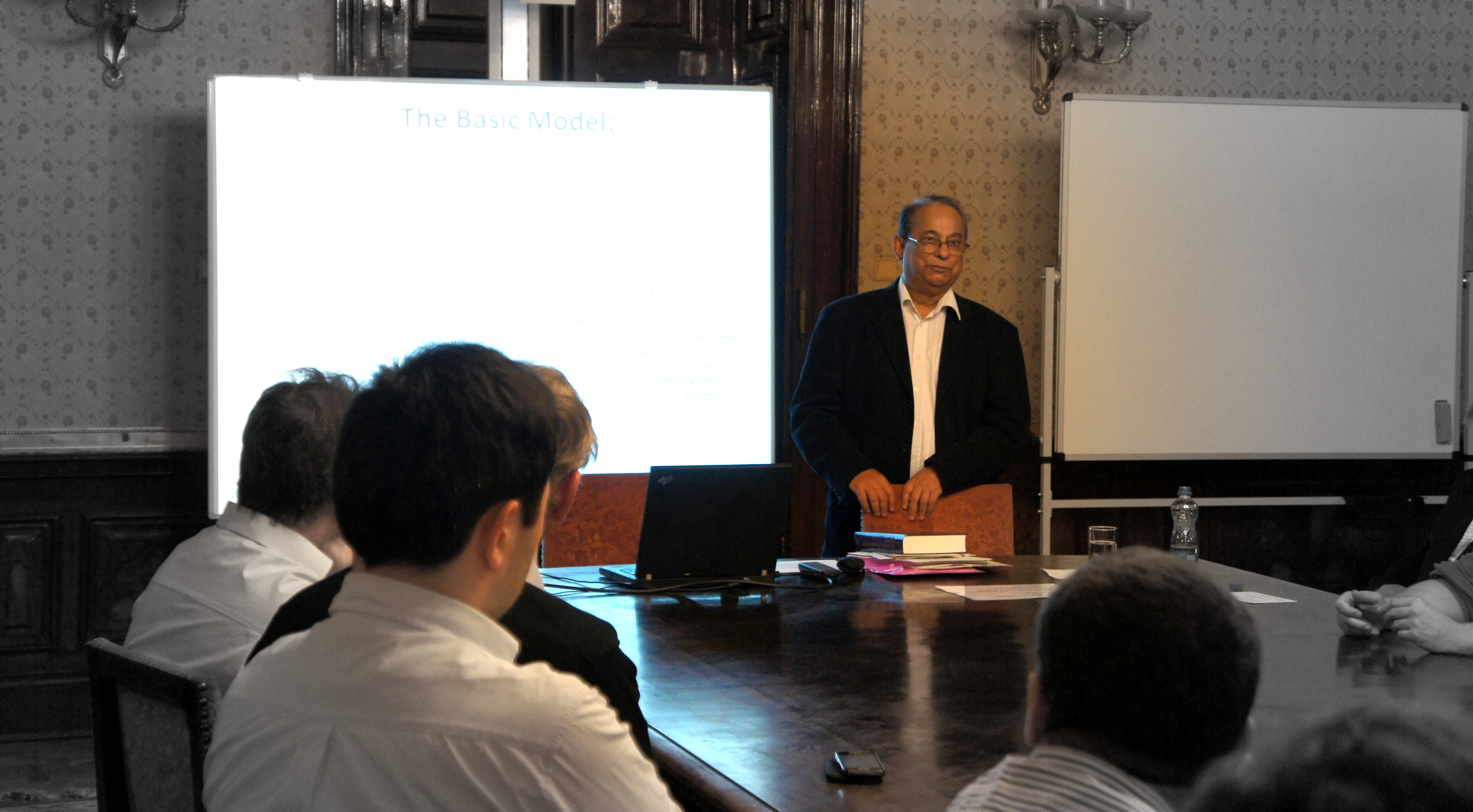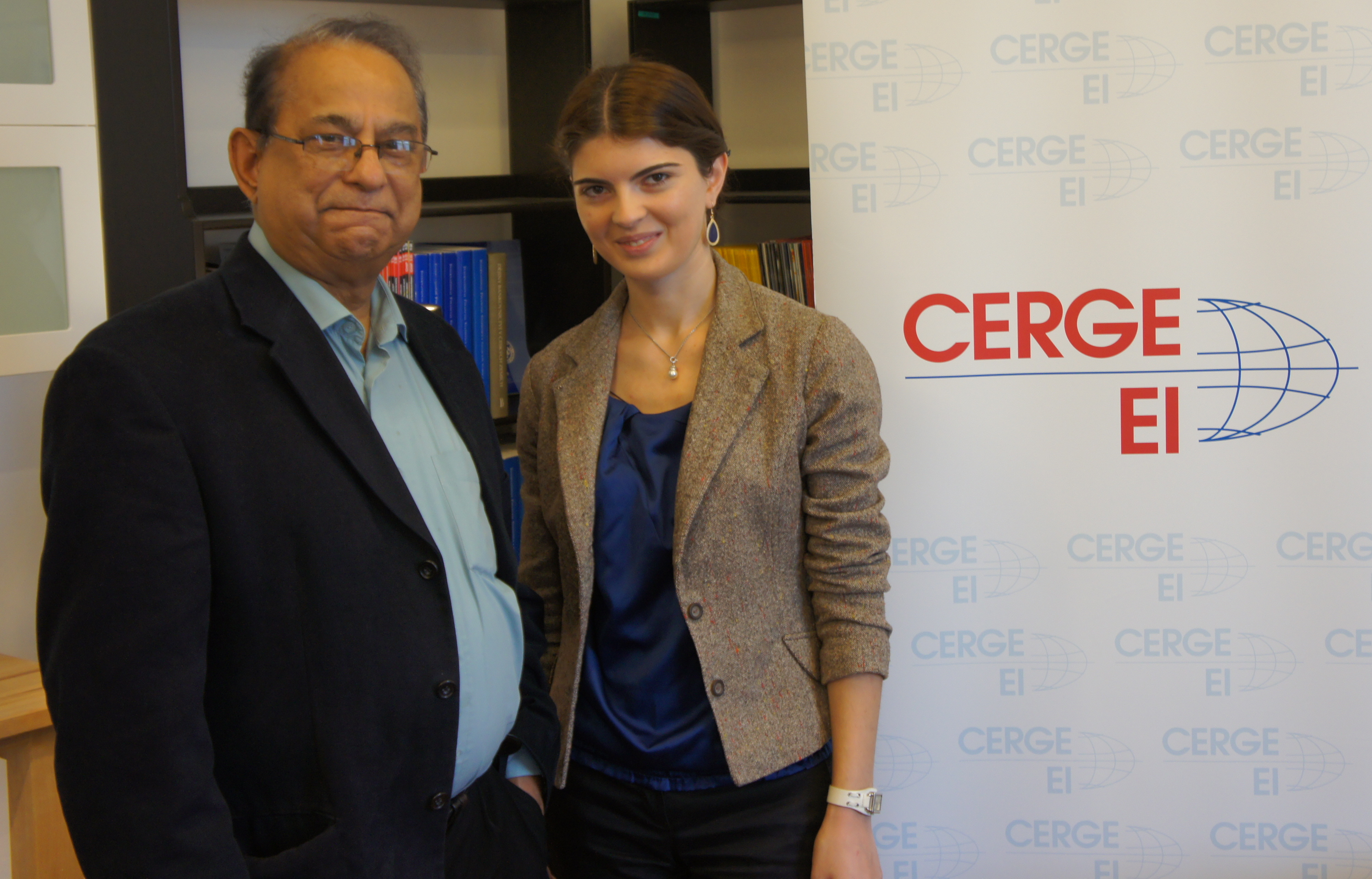Could we have predicted the crisis? Were there hidden clues and we just didn’t know where to look? Professor Bhattacharyya (University of Essex) is on a mission to measure the hidden economy and understand what it can tell us about macroeconomic instability.
Dr. Bhattacharyya’s guest lecture at CERGE-EI, titled “Predicting the 2008 Financial Crises from the Hidden Economy Estimates,” outlined how hidden economy estimates and the methodology used in the estimation procedure allow us to produce an indirect measure of ‘excessive money.’ Previous scholars, notably Raghuram Rajan, have noted that ‘excessive money’ in the economy was a primary cause of the 2008 financial crisis. Dr. Bhattacharyya paper notes that even as early as 1995 there were hidden signals suggesting a possible impending crisis for the UK economy.
were hidden signals suggesting a possible impending crisis for the UK economy.
Could we have predicted the 2008 financial crisis13 years earlier if the authorities had cared to consider this research?
Check out CERGE-EI’s brief interview with Dr. Bhattacharyya:
What is the most important insight from your research?
The most important insight, which is often missed, is that there are signals in this world which are mostly ignored by mainstream economists, and which can predict a lot of things which mainstream economics cannot. More importantly, it highlights the changing economic structure—the informal economy is taking a more important role, so learning about it and how it is interrelated with the normal ‘recorded’ economy is an important part for the future of the world. We hear now that there is 10% unemployment. But how these people can be absorbed into the system is not always necessarily through the process of formal employment—there might be informal employment structures growing. These are very fundamental questions in economic analysis. I don’t know when and how long it will take for this type of research to be taken up in a very deep way—but I won’t be surprised if one day someone working in this area becomes a Noble Prize winnerYou mentioned in your paper that already in 1995 there were signals of a possible crisis. Why were those signals left unnoticed?
necessarily through the process of formal employment—there might be informal employment structures growing. These are very fundamental questions in economic analysis. I don’t know when and how long it will take for this type of research to be taken up in a very deep way—but I won’t be surprised if one day someone working in this area becomes a Noble Prize winnerYou mentioned in your paper that already in 1995 there were signals of a possible crisis. Why were those signals left unnoticed?
The paper was written at that time with limited objectives and to satisfy journal editors further expansion was not possible.hey didn’t look at the possibility of other applications that could be there, which I tried to look at. In 1995 the discipline was just not ready enough to accept that there were other possible signal. Only in retrospect can we say that. Now the signals are out, so we know what happened, what these calculations are, and how they match together. But in 1995, they wouldn’t believe it. If it wasn’t for the 2008 collapse, these skeptics would still say our findings didn’t mean anything.
If we can show in the future that we are predicting correctly what is coming, people will take interest in this line of research.
How do you think your paper will develop this subject area?
The overall idea of my paper is that the informal economy is growing, and we need to understand why it is growing, how it is growing, and how it affects the formal economy.
If enough people take interest, or a couple of very bright people, and they develop certain parts of it, the subject area can really grow.
How did you feel when your ideas first came to prominence?
As an economist you always feel happy when others recognize your work. I was lucky enough to get a lot of publicity from the media, including radio and television interviews. All the newspapers reported about my work. As any individual in any field of life, you feel good about your successes when recognized.
What is your advice for new PhD students?
Your field of interest has to be about personal choice and aptitude. I came into this particular area by accident, doing several other things in monetary and developmental economics. There is not a standard rule. Essentially when you start reading something that you think is a topic which interests you, and you think ‘yes I can contribute here’, don’t read the paper just to assimilate what it says. You need have the attitude of criticizing and finding faults in the paper—that’s where you’ll find the right line for your own original research.
What do you think about CERGE-EI?
I can see that CERGE-EI is a very much growing institution, and becoming more and more important. Very important people are involved here, including Noble Laureates. I find it a quite stimulating environment.
Check out Professor Bhattacharyya’s draft paper here.
Interviewer: Tamta Bakhtadze, 2nd Year PhD Student


I am indeed proud of CERGE-EI and her role so far in major economic research of today. The words of the dynamic professor cannot be overemphasized, the informal economy is actually an area in economics that needs several attention and academic work on. Recent statistics opines the the informal economy constitutes the bulk of employment generated in the developing countries to the rate of about 60% and yet this sector have not properly been examined for decades now. The world bank and other development agencies further needs to develop a considerable research in this field and possibly provide an accurate data for its measurement in developing countries. As I gathered from my previous research in this area, insufficient data of course is a major challenge in doing a further research within this area.
I am an ardent follower of this blog and I have actually benefited alot from these interviews and other public lectures.